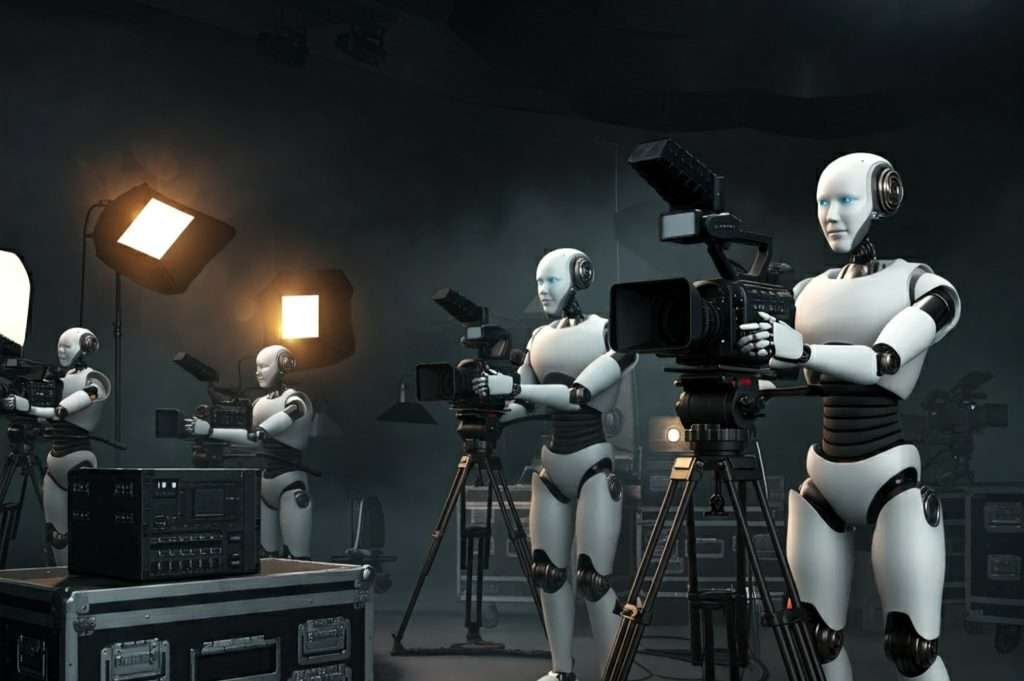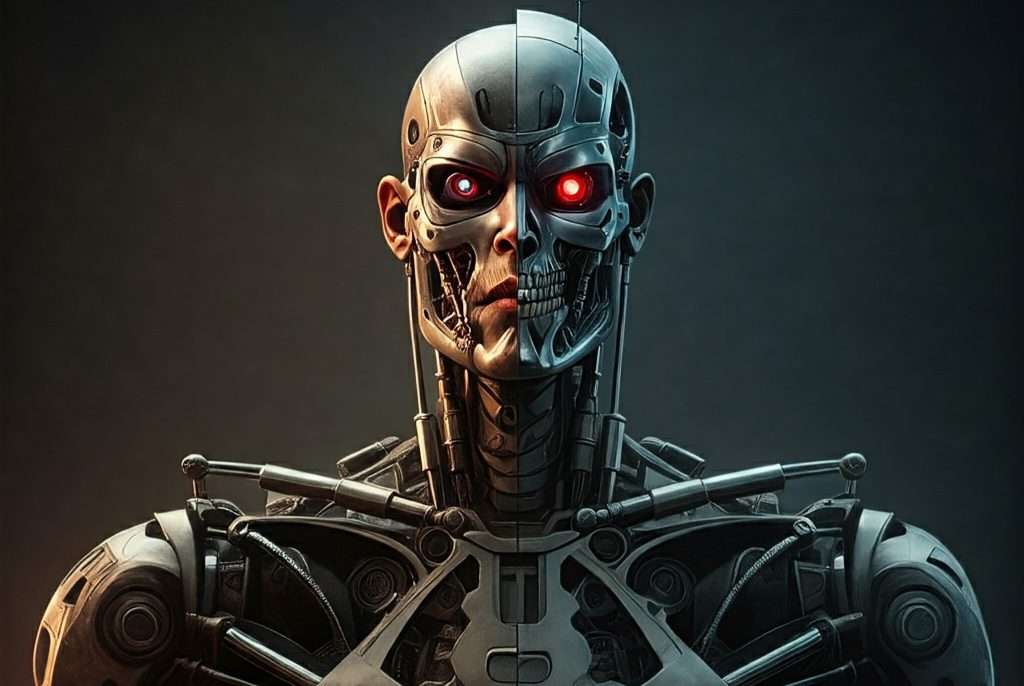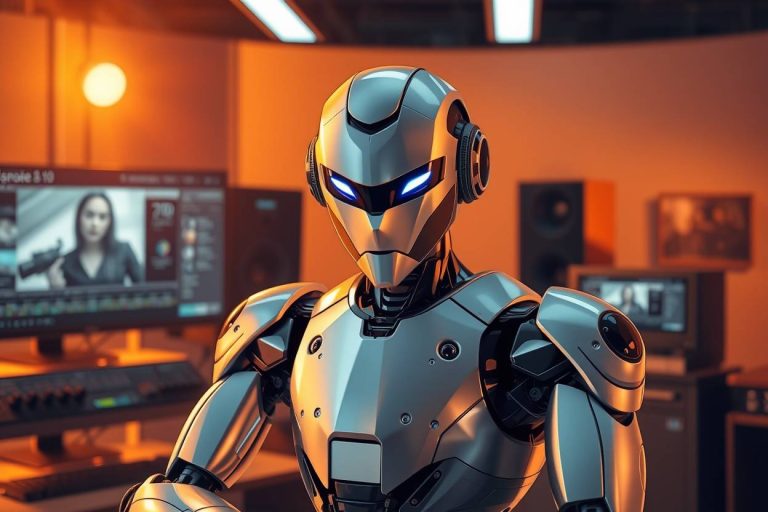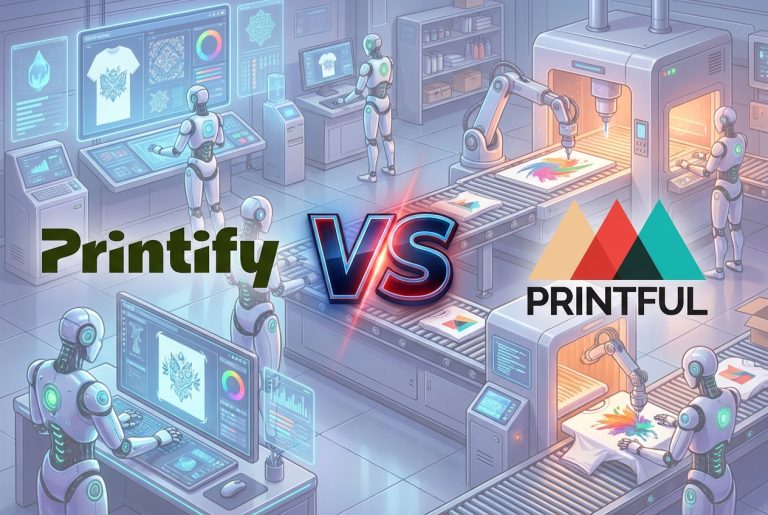How is AI Changing the Entertainment Industry?

Movies have often shown us a future where artificial intelligence will be used for most of the tasks involved in production as well as marketing. Ironically, movies are now being made with the help of AI, especially in areas like pre-production and editing. However, the real world relationship between technology and media has shown to be more of a partnership than the animation you see in those Sci-FI movies.
It’s time we dive deeper into this connection and explore how is AI changing the entertainment industry. Artificial Intelligence is already transforming the industry in ways we never imagined, by using tools such as tailored content creation and optimization, improved augmented reality and virtual reality experiences and much more.
Key Points
- AI is automating content creation, generating scripts, music, and artwork.
- AI-powered personalization enhances user experiences by offering tailored movie and music recommendations.
- AI is revolutionizing visual effects, improving video quality and facilitating video game development.
- AI streamlines marketing and content discovery, ensuring targeted advertising and personalized recommendations.
- AI is pushing boundaries in production, enabling the creation of entire movies and TV episodes.
This is a time for professionals to seize the chance to grow and make investments in the media sector. At the same time, tech lovers are looking to blend entertainment and artificial intelligence in creative ways. With the continuous evolution of this field the potential is boundless offering an exciting playground for innovation. In the future, AI is set to become a game changer in the entertainment industry. Here are some ways this transformation is taking shape.
AI-Generated Content
In recent years, artificial intelligence has made significant progress with its advanced algorithms. It is now capable of producing various types of content such as scripts, music and artwork that are used in the production of movies, TV shows and web series. This breakthrough has simplified the process, allowing creators to come up with new and innovative ideas quickly.
Content Personalization
Searching through a vast array of movies and songs to find the perfect one can be really exhausting. Even just narrowing it down using trailers or suggestions requires a fair amount of work. That’s where the power of personalization powered by AI comes in handy.
The technology can gather and analyze users’ watching and listening habits to customize recommendations based on their previous preferences. This breakthrough helps individuals uncover exactly what they’re seeking whether it’s a specific genre, movie length or favorite actor or director with minimal effort involved.
Deepfake Technology
The progress of AI in the entertainment sector opens up new avenues for artistic creativity. An impressive breakthrough is the use of deepfake technology, allowing filmmakers to blend actual historical personalities or imaginary characters into their projects. This capability could transform the way films are created.
AI-Generated Visuals
In 1993 the film Jurassic Park amazed viewers with its revolutionary animation technology that brought dinosaurs to life. While it was impressive at the time, it now appears somewhat dated in light of the progress made in visual effects. A new AI tool named Showrunner highlights the increasing impact of AI on animation and visual arts.
Created by the simulation, this tool recently generated an episode of South Park solely through AI, including the script plot, voice recordings and animations. The episode even addressed the Hollywood strike, all made feasible by training the AI, on existing South Park material.
Real-Time Translation and Subtitling
The entertainment industry is undergoing a transformation using AI technology, which is enabling content to reach audiences worldwide through instant translation and subtitling. This innovation allows spoken or written words to be translated instantly so that viewers can enjoy films or shows in their preferred language with subtitles or translated audio. This advancement is particularly advantageous, for distributing content globally as it allows media to cross borders and engage with diverse audiences more easily, than ever before.
Voice and Speech Recognition
The progress in AI driven voice and speech recognition technology is a thrilling development. Streaming platforms use these systems to enable users to manage their devices or explore content through voice commands. Additionally AI is simplifying dubbing and translation procedures, enhancing the accessibility of entertainment for various audiences.
Improved Video Quality
AI has made progress in enhancing both film and video game production processes and outcomes. For example, AI powered editing tools can streamline the post-production phase by automating tasks such as color correction, audio syncing and scene selection. This not only saves filmmakers time and effort but also allows them to focus on the aspects of their projects.
Moreover, AI driven special effects software enables the creation of hyper realistic simulations, reducing the need for props and green screens, thus increasing production efficiency. In the realm of video games, AI plays a crucial role in developing non player characters NPCs. These AI-powered NPCs can interact with players in a more way, adapting to different scenarios. Additionally, AI generated environments and levels are becoming more prevalent providing gamers with immersive worlds to explore.
Online-Based Audience Targeting
Tools such as Google Ads and Google AdSense leverage AI technology to tailor ads based on individual preferences and browsing behaviors. This level of targeting enhances the chances of reaching the audience for advertisers, boosting the impact and success rates of their campaigns. By focusing on demographics, businesses can optimize their marketing expenditures for better results.
Content Classifying and Categorizing
Online streaming platforms have embraced AI to enhance content discovery for their users. AI algorithms analyze elements such as objects, scenes, and metadata, enabling more accurate genre classification and tailored recommendations. By streamlining content categorization, AI allows users to quickly find what they’re looking for based on criteria like cast, crew, or genre. This automated system enhances the user experience by making relevant content easier to discover.
Composing Screenplays
For filmmakers, leveraging AI to generate compelling and marketable screenplays is becoming a strategic move. Machine learning algorithms, trained on vast amounts of screenplay data, can now quickly produce new, original scripts, helping save both time and costs in the filmmaking process. AI can also assist with script analysis, identifying ambiguities, questions, and suggestions, thereby streamlining the script review process and improving the overall quality of the screenplay.
Movie Production
AI has even ventured into the actual production of movies. One notable example is the collaboration between Benjamin AI and Ross Goodwin, who, in just 48 hours, created the science fiction film *Zone Out*. While the movie might not be an award-winner, it marks a significant breakthrough in the use of AI technology to automate video production.
Promotion and Marketing
Marketing is critical for any entertainment project, and publishers, authors, and creators often use social media platforms, organize launch events, and create promotional content to reach their target audience. AI in marketing is now helping optimize these efforts by improving ad placements, providing real-time analytics to assess marketing effectiveness, and simplifying campaign management. AI also excels at analyzing data to ensure that ads and promotions reach the most relevant audiences. By identifying trends and refining strategies, AI-powered tools can significantly boost awareness and sales.
Supporting the Pre-Production Phase
AI is also transforming the pre-production phase of filmmaking by automating various tasks and increasing overall efficiency. For instance, AI can analyze scripts to help organize logistical elements, such as shoot preparation. Virtual location scouting offers possible filming sites, and AI can help develop efficient schedules by estimating how long tasks will take. While AI is a valuable tool in the film industry, human judgment and creativity remain irreplaceable in delivering those unforgettable cinematic experiences.
Limitations of AI

Despite all these benefits, there are some limitations for AI. It’s essential for content creators, marketers, producers and even consumers to know them.
AI Video Challenges
Despite the huge potential AI video generation has, there are many challenges that need to be solved before it can be widely adopted and used across industries.
Content Complexity
Videos are more than just visuals – there are facial expressions, speech and context to consider. Current AI models can’t capture real world scenes and emotions perfectly. The inability to get all the details right can make AI generated content feel fake.
Ethical and Legal
AI generated content raises many ethical concerns, especially when it comes to creating misleading or harmful content. Who owns the content – the creator of the AI, the user, or the AI itself? These need to be solved for the technology to move forward responsibly.
Content Streaming
Even with a number of platforms and devices available for streaming of cogent AI technologies are not fully capable of streaming geo restricted content. Despite the availability of streaming devices like Amazon Firestick, AI tools cannot stream content in restricted locations. However, VPNs can help solve the issues by using virtual servers to stream content in any location. Users can learn more about Firestick VPN and use it to stream their favourite movies, TV shows and sports events that are otherwise restricted for streaming in their location. However, AI tools don’t offer a satisfactory solution for streaming of geo restricted content.
Lack of Fine-Tuning
Currently, AI video generation lacks the precision to give creators full control over the output. This limits the ability to tailor the video to specific artistic or narrative goals. Fine-tuning a scene or making sure everything aligns with the creator’s vision is a challenge, if not impossible.
Realism and the Uncanny Valley
One of the biggest challenges in AI video generation is realism. While AI has made a lot of progress, generated videos can sometimes enter the uncanny valley. In this state, the content looks almost real but not quite, and it feels eerie or unsettling to the viewer. Overcoming this is key to getting wider adoption of AI generated videos.
Summing Up
The influence of AI on the entertainment sector is clear, revolutionizing everything from creating content to promoting it and engaging with audiences. Through features that tailor content enhance video quality and even write scripts, AI is changing the way entertainment is made and enjoyed. Nevertheless, hurdles such as making content realistic, addressing ethical issues and maintaining control pose challenges to widespread use. As AI advances, creators and technology fans must collaborate to harness its capabilities, ensuring that it boosts creativity while responsibly managing its limitations. The future of entertainment driven by AI holds great potential and endless possibilities.




